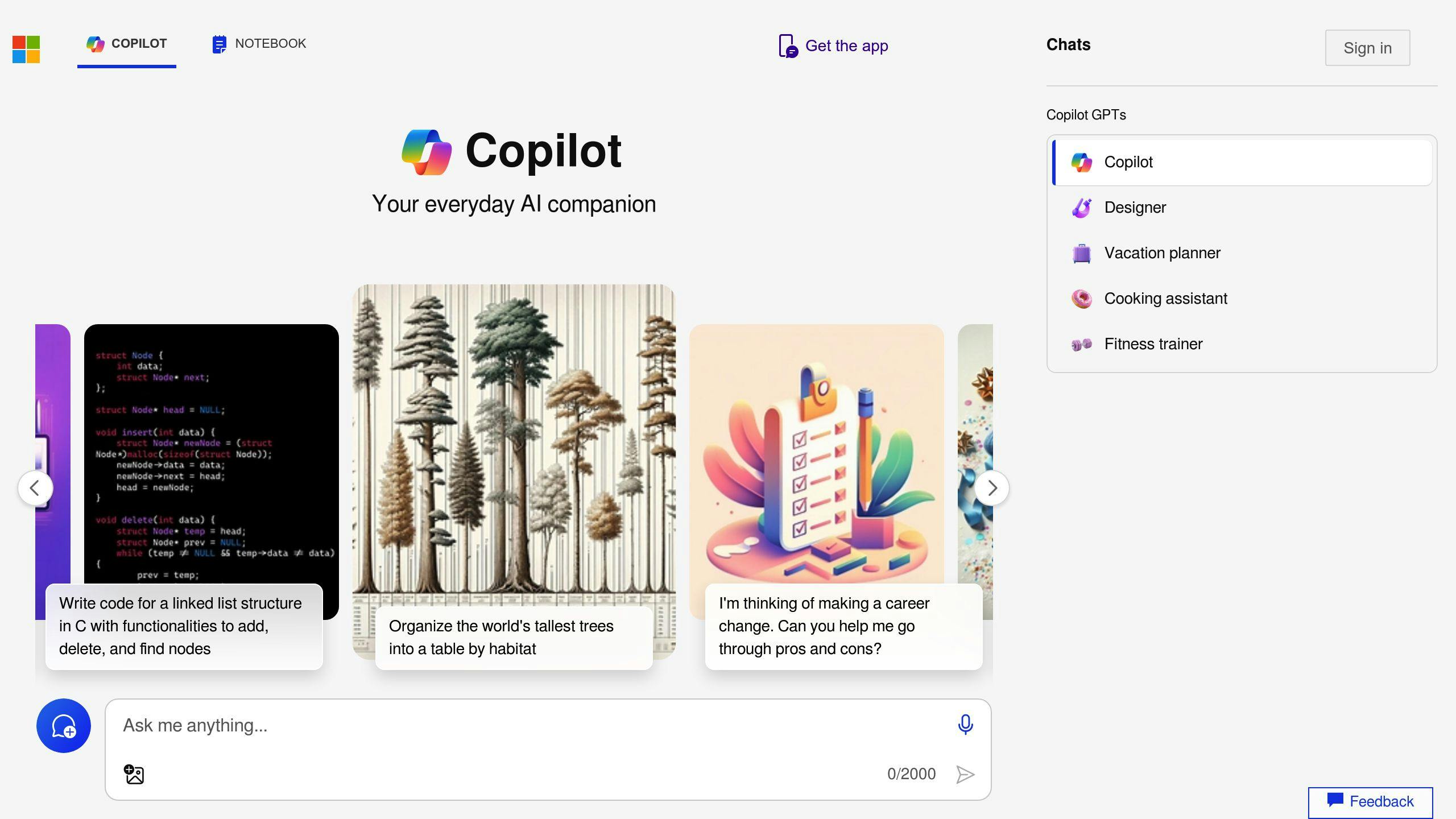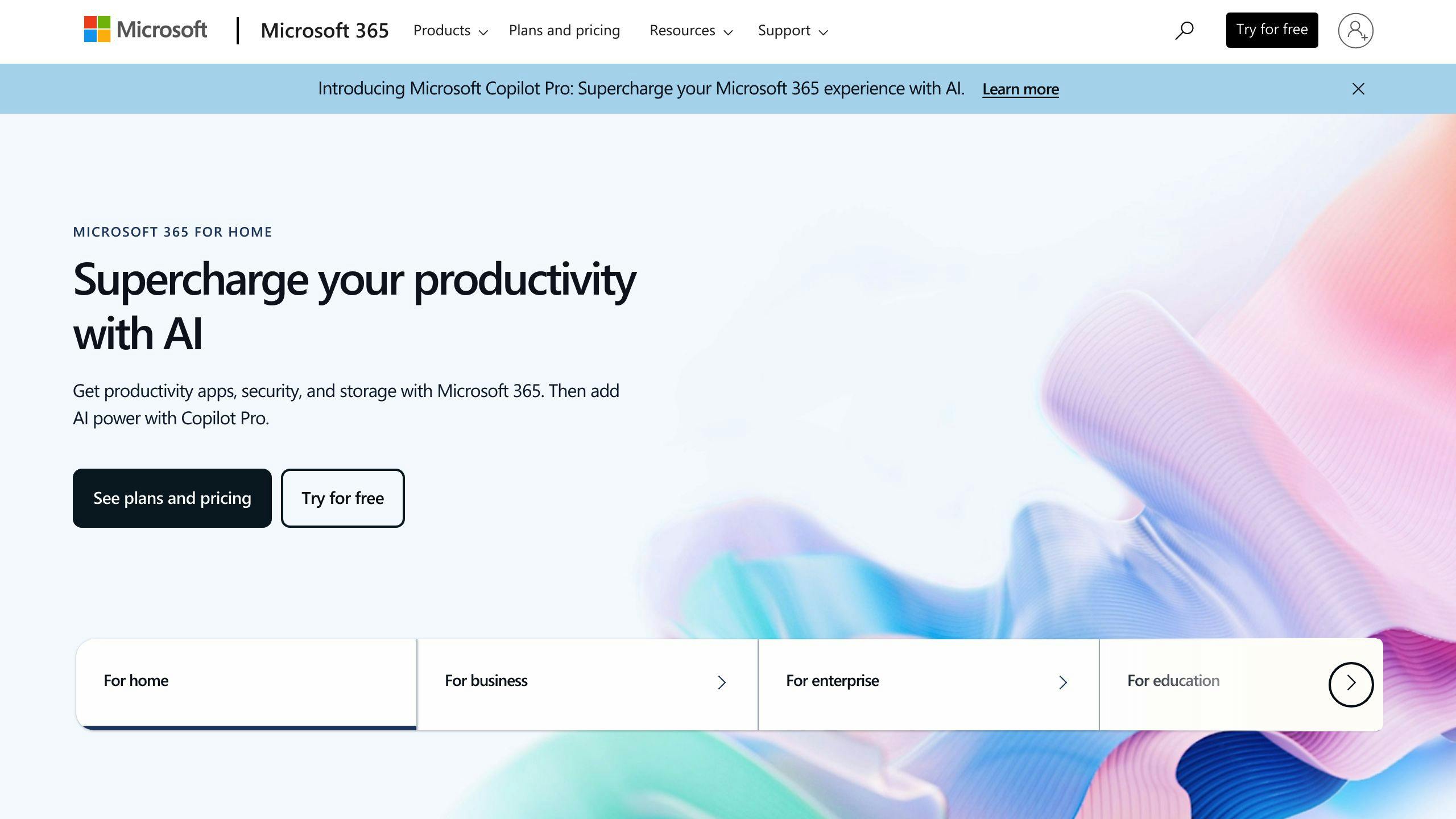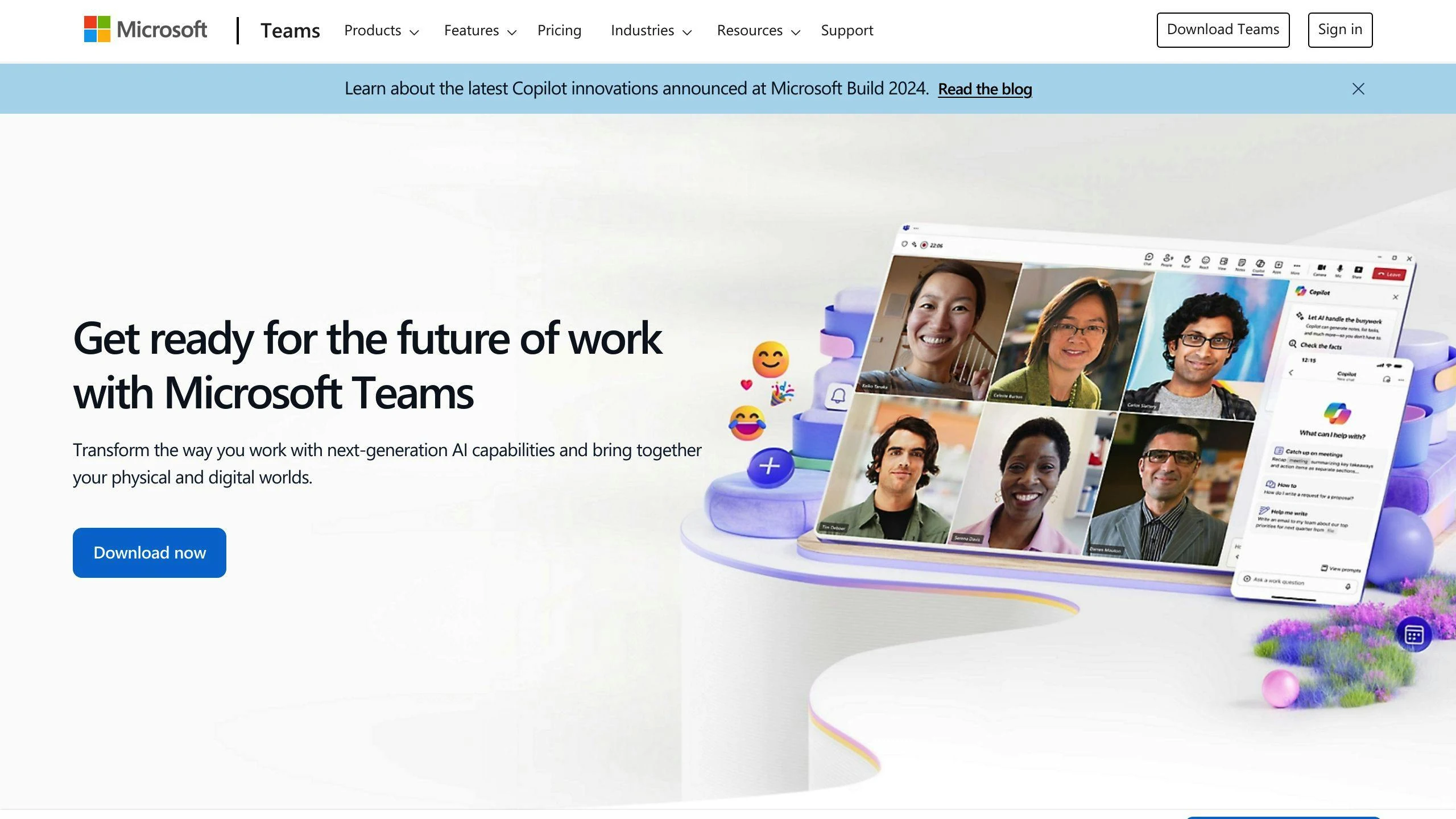Microsoft 365 Copilot is an AI assistant that works with you in everyday Microsoft apps. Here’s what you need to know:
- It’s built into Word, Excel, PowerPoint, Outlook, and Teams
- Helps with writing, data analysis, presentations, emails, and meetings
- Requires a Microsoft 365 subscription and $30/month add-on license
Key benefits:
- Saves time on repetitive tasks
- Improves productivity across apps
- Helps catch up on missed information
To get started:
- Open a Copilot-enabled app
- Find the Copilot button in the menu ribbon
- Click to activate
Tips for best results:
- Be specific in your requests
- Always review and edit Copilot’s output
- Combine AI help with your own expertise
| App | What Copilot Can Do |
|---|---|
| Word | Draft and edit documents |
| Excel | Analyze data and create charts |
| PowerPoint | Generate slide decks |
| Outlook | Summarize emails and draft responses |
| Teams | Recap meetings and track action items |
Remember: Copilot is a helper, not a replacement for your skills and judgment.
Related video from YouTube
What is Microsoft 365 Copilot?

Microsoft 365 Copilot is an AI sidekick that works with you in your everyday Microsoft apps. It’s here to make your work life easier and more creative.
How It Works
Copilot mixes AI smarts with your Microsoft 365 data. It’s not just about doing things faster – it’s about working smarter and freeing up your time.
What Can It Do?
Copilot can:
- Write drafts
- Sum up long texts
- Make presentations
- Crunch numbers
- Recap meetings
Where You’ll Find It
Copilot fits right into:
| App | What It Does |
|---|---|
| Word | Writes and edits |
| Excel | Analyzes data |
| PowerPoint | Creates slides |
| Outlook | Handles emails |
| Teams | Manages meetings |
Satya Nadella, Microsoft’s CEO, says:
"This is a big step in how we use computers. It’ll change how we work and boost productivity."
Here’s a cool trick: In Word, just tell Copilot, "Write a feature announcement based on the IT doc." Don’t like it? Hit "Regenerate" for a new version.
Think of Copilot as your AI buddy, ready to help you work smarter across all your Microsoft 365 apps.
Getting ready to use Copilot
Let’s dive into what you need to start using Microsoft 365 Copilot:
License options
You’ll need two things:
- An eligible Microsoft 365 or Office 365 plan
- A Copilot add-on license ($30 per user per month)
Copilot works with plans like Microsoft 365 E3, E5, Business Standard, and Business Premium, as well as Office 365 E1, E3, and E5.
"The price for Microsoft 365 Copilot is $30 per user per month, regardless of industry, size, and Enterprise Agreement discount level."
Here’s how Copilot affects your total Microsoft 365 costs:
| Existing M365 plan | Cost increase |
|---|---|
| Microsoft 365 E5 | 53% |
| Microsoft 365 E3 | 83% |
| Microsoft 365 Business Premium | 136% |
| Microsoft 365 Business Standard | 240% |
Computer requirements
Make sure you have:
- Windows 10 or 11 (11 is better)
- "Current" or "Monthly Enterprise Channel" for Microsoft 365 apps
- Network access to Microsoft 365 endpoints
Required permissions
Users need:
- Microsoft Entra ID (formerly Azure Active Directory)
- OneDrive account
- Accounts on all Microsoft 365 apps, including the new Outlook
IT admins should:
- Assign Copilot licenses in the Microsoft 365 admin center
- Set up whiteboard access for Teams users
- Check and update privacy settings in Microsoft 365 apps
"Create a plan around data access and management as a crucial first step before installation and setup of Copilot."
How to start using Copilot
Ready to dive into Microsoft 365 Copilot? Here’s how:
First-time setup
- Open a Copilot-enabled Microsoft 365 app (Word, Excel, PowerPoint, Outlook, or Teams)
- Find the Copilot button in the menu ribbon
- Click to activate
Copilot might pop up on its own in apps like Word or PowerPoint when you create a new document.
Adjusting settings
To customize Copilot:
- Head to the Microsoft 365 admin center
- Find the Copilot settings section
- Tweak features to your liking
You can turn on "feedback features" to boost your Copilot experience.
Understanding the layout
Copilot blends right into Microsoft 365 apps. Here’s what you’ll see:
| Feature | Location | Function |
|---|---|---|
| Command bar | Top | Enter prompts or questions |
| Sidebar | Right side | View Copilot’s responses |
| Copilot button | Menu ribbon | Quick access to Copilot |
In Outlook, Copilot’s in the email composition window. For Teams, it helps during meetings with tasks like summarizing discussions.
To get the most out of Copilot:
- Start simple: Clear requests lead to accurate responses
- Review output: Make sure it fits your needs
- Experiment: Try different prompts to explore Copilot’s abilities
For example, in Word, ask Copilot to "Summarize the key points from this document" for a quick overview.
Basic tips for using Copilot
How to ask Copilot for help
Want Copilot to work its magic? Here’s the secret sauce:
- Give it clear context
- Follow up with specific instructions
For example, in Word, try this:
Summarize this document's key points. Focus on main arguments and supporting evidence.
Simple, right? This gives Copilot a clear target to aim for.
Writing clear requests
To get the best out of Copilot, your prompts need to be spot-on. Include these:
- Your goal
- Some background
- Where to find the data
- What you expect
Instead of "Write about our product", go for:
Draft a 500-word description for our new AI coffee maker. Use 'Product_Specs.docx' for features. Highlight how it makes mornings easier for busy professionals.
Using Copilot’s answers
Got Copilot’s response? Great! Now:
- Give it a thorough once-over
- Make sure it’s accurate and on-point
- If needed, tweak your prompt and try again
Remember: Copilot’s here to help, not do your job. Always double-check important stuff and add your own expertise.
| Do’s | Don’ts |
|---|---|
| Be specific | Make vague requests |
| Break big tasks into smaller bits | Expect perfection without review |
| Refine your prompts | Rely only on Copilot |
| Use Copilot across Microsoft 365 | Skip fact-checking |
Advanced Copilot techniques
Using Copilot across Microsoft 365

Copilot works in many Microsoft 365 apps. Here’s how:
- Word: Draft, edit, or summarize. Try: "Summarize this report in 3 bullet points."
- PowerPoint: Make slides fast. Ask: "Create a 5-slide deck on Q4 sales."
- Excel: Get data insights. Say: "Show monthly sales trend for last year."
- Outlook: Manage emails. Try: "Sum up unread Johnson project emails."
- Teams: Track meetings. Ask: "What did we decide in yesterday’s budget meeting?"
Fitting Copilot into your work routine
Make Copilot your daily helper:
1. Morning: Use Teams Copilot to check messages and plan your day.
2. Pre-meeting: Ask Copilot to summarize relevant emails and docs.
3. Writing: Let Copilot draft, then you edit.
4. Data work: Use Excel Copilot for quick trends and charts.
5. End of day: Ask Copilot to list your achievements and pending tasks.
Adapting Copilot for specific jobs
Customize Copilot for your role:
- Sales: Link to Salesforce. Ask: "My top 3 opportunities this quarter?"
- HR: Connect to Workday. Try: "How many vacation days left?"
- Finance: Use with SAP. Ask: "Latest expense report status?"
- Project management: Create custom plugins. Say: "List overdue website redesign tasks."
"The focus of Copilot Studio is to enable employees to improve their workflows today." – Microsoft
sbb-itb-8be0fd2
Tips for getting the best results
How to ask good questions
Want Copilot to give you awesome answers? Be specific. Tell it exactly what you need.
Instead of "Write a report", try this:
"Draft a 500-word report on Q4 sales. Use our ‘Q4_Sales_2023.xlsx’ spreadsheet. Focus on top products and improvement areas. Compare to Q3 briefly."
See the difference? The more details you give, the better Copilot can help.
Checking and improving Copilot’s work
Copilot’s smart, but not perfect. Always double-check its work:
- Read everything
- Verify facts and numbers
- Spot areas needing more info
- Ask for specific revisions
Not happy with part of Copilot’s draft? Just say:
"Rewrite the third paragraph. Focus more on customer satisfaction scores. Use specific data from our recent survey."
Combining AI help with human knowledge
Copilot’s great, but it’s not you. Use it to kickstart tasks, then add your expertise.
| Task | Copilot Does | You Do |
|---|---|---|
| Data Analysis | Initial insights | Add context, interpret |
| Writing | First draft | Edit, personalize |
| Presentations | Basic slides | Refine design, add depth |
| Emails | Summarize threads | Make choices, add personal touch |
Copilot’s a helper, not a replacement. As Sarah Lundy from Microsoft IT Communications says:
"If you go a little deeper and add something like, ‘Make sure you touch on these three items,’ you can get dramatically better results, which can help you avoid having to make edits later."
Use Copilot to boost your work, not do it for you.
Fixing common problems
Using Microsoft 365 Copilot and hit a snag? Let’s tackle the most common issues.
Connection issues
Can’t connect? Try these:
- Check your internet
- Make sure Microsoft’s servers are up
- Restart your router and modem
Still no luck? Go deeper:
| Step | Action |
|---|---|
| 1 | Check firewall settings |
| 2 | Update network drivers |
| 3 | Call IT support |
Odd responses
Copilot giving weird answers? Here’s what to do:
- Hit refresh
- Clear cache and cookies (Ctrl + Shift + Delete in Edge)
- Turn off browser add-ons
If it’s still acting up, tell Microsoft. They’re working on it.
Access problems
Can’t get in? It might be your account or where your files are:
- Sign in with the right Copilot-licensed account
- Move files to OneDrive or SharePoint
- Allow third-party cookies for web apps
"If you’re still stuck after trying these, get in touch with Support", says Microsoft’s guide for home users.
Improving your work with Copilot
Microsoft 365 Copilot is your new productivity sidekick. Here’s how it can supercharge your workday:
Saving time with Copilot
Copilot takes care of the small stuff so you can focus on what matters:
- It summarizes long email threads and drafts responses in Outlook
- Organizes meetings and creates action points
- Generates and formats content in Word and PowerPoint
A marketing team used Copilot to create campaign proposals in PowerPoint. The result? They cut prep time in HALF and spent more time on strategy.
Letting Copilot handle repetitive work
Say goodbye to boring tasks:
| Task | Copilot’s Magic |
|---|---|
| Data entry | Automates Excel input |
| Report generation | Creates financial reports |
| Scheduling | Manages calendars |
An accounting team put Copilot to work on monthly financial reports. They slashed report time from days to hours and reduced errors.
Working better with your team
Copilot is like a digital team assistant:
- Summarizes discussions and tracks questions during calls
- Provides insights during conversations
- Helps team members catch up on missed info
"86% of early Copilot users said it made catching up on missed information easier." – Microsoft study
Want to boost teamwork with Copilot? Try this:
1. Ask for discussion summaries in Teams chats
2. Use the Copilot compose box during meetings
3. Request action item lists after meetings
Copilot isn’t just a tool – it’s your productivity partner. Give it a shot and watch your workday transform.
Keeping up with Copilot changes
Copilot for Microsoft 365 is always changing. Here’s how to stay informed:
New features
Microsoft updates Copilot monthly. To keep up:
- Check the Microsoft 365 Roadmap
- Read monthly "What’s New" blog posts
- Pin Copilot in Microsoft 365 apps for in-app updates
For instance, April 2024 brought 16 new languages and better Excel data handling.
User groups
Connect with other Copilot users:
- Join the Microsoft 365 Copilot community
- Attend Ask Microsoft Anything (AMA) sessions
- Chat with users and Microsoft experts
These groups are goldmines for tips and tricks.
Official Microsoft help
For support and guidance:
| Resource | What it offers |
|---|---|
| Copilot Academy | Learning content in Viva Learning |
| Deployment Kit | Pre-made comms and campaign briefs |
| M365 admin center | Copilot settings (Global Admin needed) |
Don’t forget to give feedback as you use Copilot. The thumbs up/down feature helps improve the service.
"86% of early Copilot users said it made catching up on missed information easier." – Microsoft study
Conclusion
Microsoft 365 Copilot is shaking up how we use Microsoft apps. It’s like having a smart assistant for your emails, data, and presentations. Here’s the scoop:
- It works with Word, Excel, PowerPoint, Outlook, and Teams
- It can write emails, crunch numbers, and create content
- You need a Microsoft 365 subscription to use it
Want to make the most of Copilot? Try this:
1. Start small
Kick off with easy stuff like drafting emails. Once you’re comfortable, tackle bigger tasks.
2. Be specific
Tell Copilot exactly what you need. It’s smart, but not a mind reader.
3. Double-check
Copilot’s good, but not perfect. Always review its work.
4. Stay updated
Copilot evolves fast. Keep an eye on Microsoft’s blog for new features.
"86% of early Copilot users said it made catching up on missed information easier." – Microsoft study
That’s a big win for saving time and boosting productivity.
FAQs
How do you enable Copilot in Teams?

Want to use Copilot in Microsoft Teams? Here’s how:
- Open Teams and go to Chat
- Pick a chat from your list
- Find the Copilot icon (top-right corner)
- Click "Open Copilot"
Now you’ll see a compose box on the right. Click "More prompts" for options like:
- Highlights from the past day
- Summarize recent messages
- Ask questions about the chat history
| Feature | What it does |
|---|---|
| Chat summaries | Gives you key points from 1, 7, or 30 days of chat |
| Q&A | Answers questions about chat history |
| Highlights | Shows important stuff from recent talks |
Make sure you’re signed in with your Microsoft Entra account. Can’t access Copilot? Double-check that your account has an active license.
Microsoft says: "Copilot doesn’t share data with third parties or use user data to train the model."
For Teams admins: You can turn Copilot on or off in the Microsoft 365 Admin Center. Meeting hosts can set Copilot to work during meetings only or both during and after.
